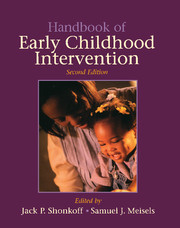Book contents
- Frontmatter
- Contents
- Foreword
- Preface
- Contributors
- PART ONE INTRODUCTION
- PART TWO CONCEPTS OF DEVELOPMENTAL VULNERABILITY AND RESILIENCE
- PART THREE THEORETICAL FRAMEWORKS FOR INTERVENTION
- PART FOUR APPROACHES TO ASSESSMENT
- PART FIVE SERVICE DELIVERY MODELS AND SYSTEMS
- PART SIX MEASURING THE IMPACT OF SERVICE DELIVERY
- PART SEVEN NEW DIRECTIONS FOR THE TWENTY-FIRST CENTURY
- 26 Early Childhood Intervention Policies: An International Perspective
- 27 Evolution of Family–Professional Partnerships: Collective Empowerment as the Model for the Early Twenty-First Century
- 28 Resilience Reconsidered: Conceptual Considerations, Empirical Findings, and Policy Implications
- Name Index
- Subject Index
27 - Evolution of Family–Professional Partnerships: Collective Empowerment as the Model for the Early Twenty-First Century
Published online by Cambridge University Press: 05 November 2011
- Frontmatter
- Contents
- Foreword
- Preface
- Contributors
- PART ONE INTRODUCTION
- PART TWO CONCEPTS OF DEVELOPMENTAL VULNERABILITY AND RESILIENCE
- PART THREE THEORETICAL FRAMEWORKS FOR INTERVENTION
- PART FOUR APPROACHES TO ASSESSMENT
- PART FIVE SERVICE DELIVERY MODELS AND SYSTEMS
- PART SIX MEASURING THE IMPACT OF SERVICE DELIVERY
- PART SEVEN NEW DIRECTIONS FOR THE TWENTY-FIRST CENTURY
- 26 Early Childhood Intervention Policies: An International Perspective
- 27 Evolution of Family–Professional Partnerships: Collective Empowerment as the Model for the Early Twenty-First Century
- 28 Resilience Reconsidered: Conceptual Considerations, Empirical Findings, and Policy Implications
- Name Index
- Subject Index
Summary
In this chapter we present four models of parent–professional partnerships, including a discussion of the power relationships within each. The approaches that we discuss include 1) parent counseling/psychotherapy, 2) family involvement, 3) family-centered services, and 4) collective empowerment. The research and professional literature upon which we base our analysis is drawn from the early childhood special education field. That literature has been constructed primarily since the 1950s with a focus on young children with developmental disabilities. Family–professional partnership trends in other areas of early childhood services have differed from those that we are presenting; however, it is beyond the scope of a single chapter to analyze partnership models within all early childhood fields.
We begin the chapter with a discussion of the type of power – power-over, power-with, and power-through – that are generally inherent in each of the four family–professional partnership models. The models are further portrayed through the use of a what-might-have-been vignette. We begin the chapter with a vignette of an imaginary family, one that prototypically might be known to any service provider. As we discuss each of the models and the power relationships within those models, we suggest how that model may have been brought to bear on that family.
Jeanette A. is a 37-year-old African American woman who lives in a community of approximately 65,000 people in an eastern state. Her daughter, Tisha, was born at 26 weeks gestation, weighing 1 pound, 12 ounces.
- Type
- Chapter
- Information
- Handbook of Early Childhood Intervention , pp. 630 - 650Publisher: Cambridge University PressPrint publication year: 2000
- 64
- Cited by



